Analysing Globalisation's Effects on Spain: An Economic Report
VerifiedAdded on 2022/08/23
|8
|1641
|16
Report
AI Summary
This report analyzes the impact of globalisation on Spain's economy, focusing on the effects of trade liberalisation, Spain's integration into the EU, changes in monetary policy, and modifications to the legal system. It examines how these factors have influenced Spain's economic development, including changes in export and import relations, and the evolution of the service industry. The report also considers the potential effects of a slowing down or reversal of globalisation on Spain, addressing challenges in the labour market and employment rates. Furthermore, it discusses the strategies Spain might employ to navigate these challenges, including adjustments to wage moderation, labour market reforms, and the need to address inflationary pressures and regional disparities. The study provides a comprehensive overview of the challenges and opportunities presented by globalisation and its potential reversal for the Spanish economy, drawing on various academic sources.
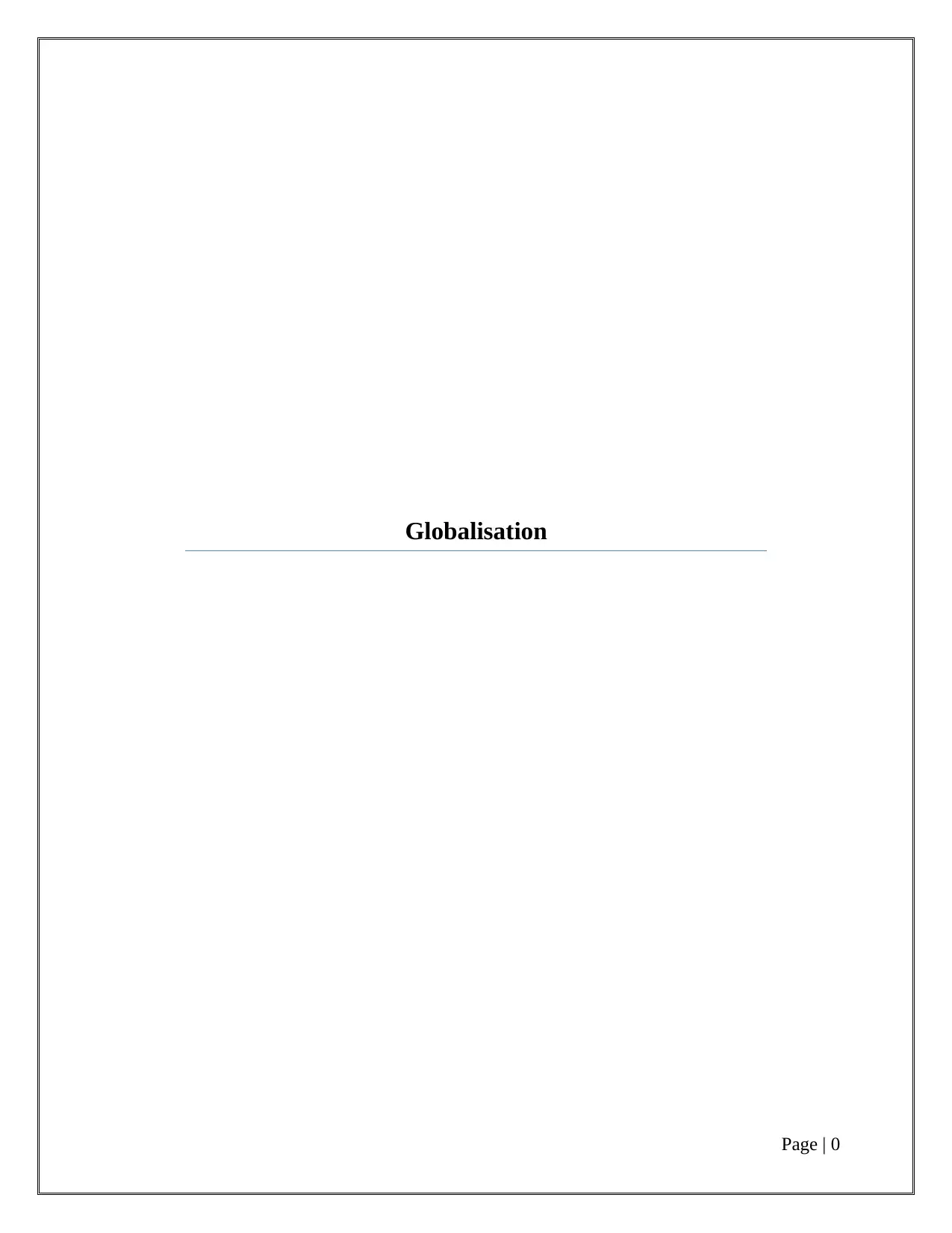
Globalisation
Page | 0
Page | 0
Paraphrase This Document
Need a fresh take? Get an instant paraphrase of this document with our AI Paraphraser
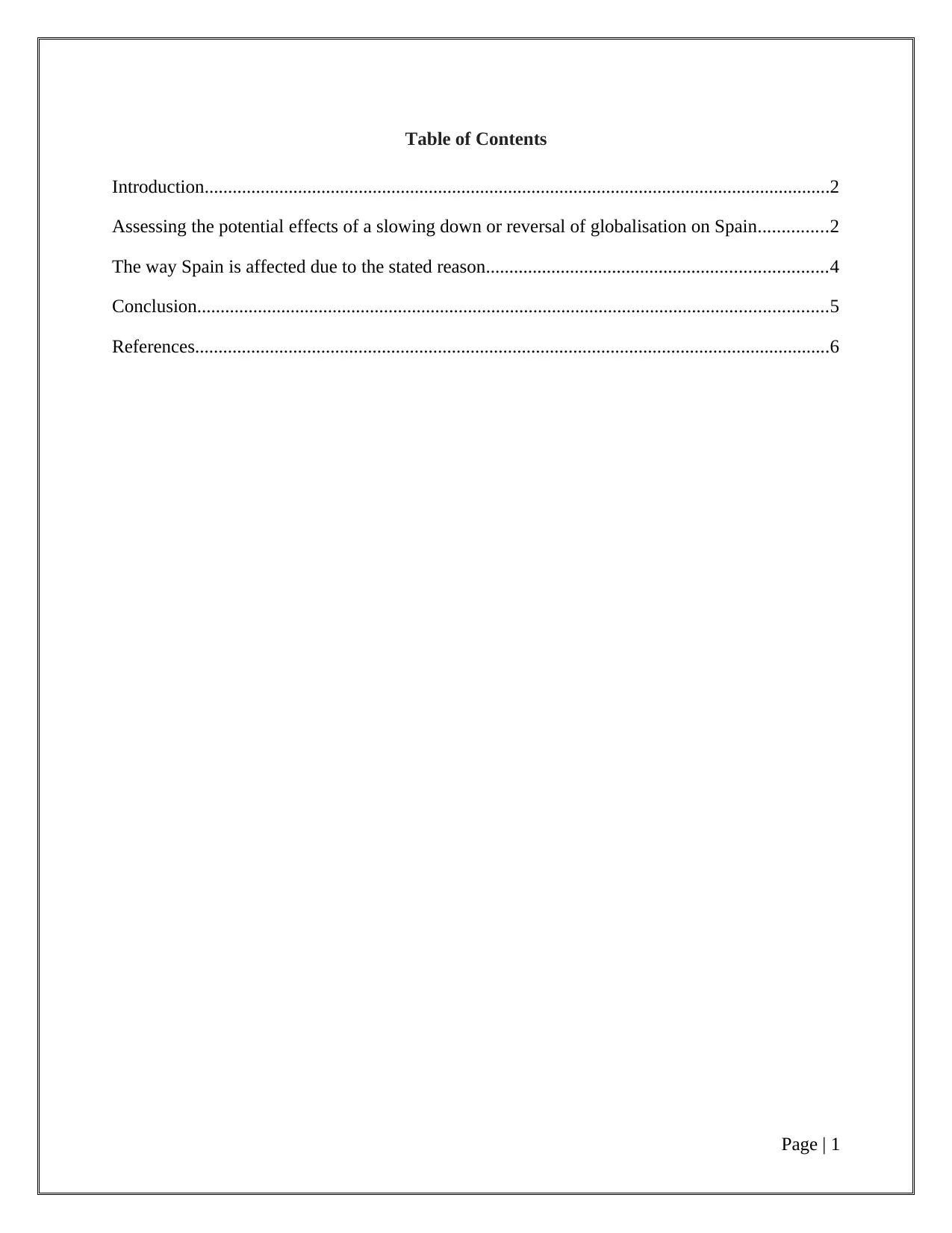
Table of Contents
Introduction......................................................................................................................................2
Assessing the potential effects of a slowing down or reversal of globalisation on Spain...............2
The way Spain is affected due to the stated reason.........................................................................4
Conclusion.......................................................................................................................................5
References........................................................................................................................................6
Page | 1
Introduction......................................................................................................................................2
Assessing the potential effects of a slowing down or reversal of globalisation on Spain...............2
The way Spain is affected due to the stated reason.........................................................................4
Conclusion.......................................................................................................................................5
References........................................................................................................................................6
Page | 1
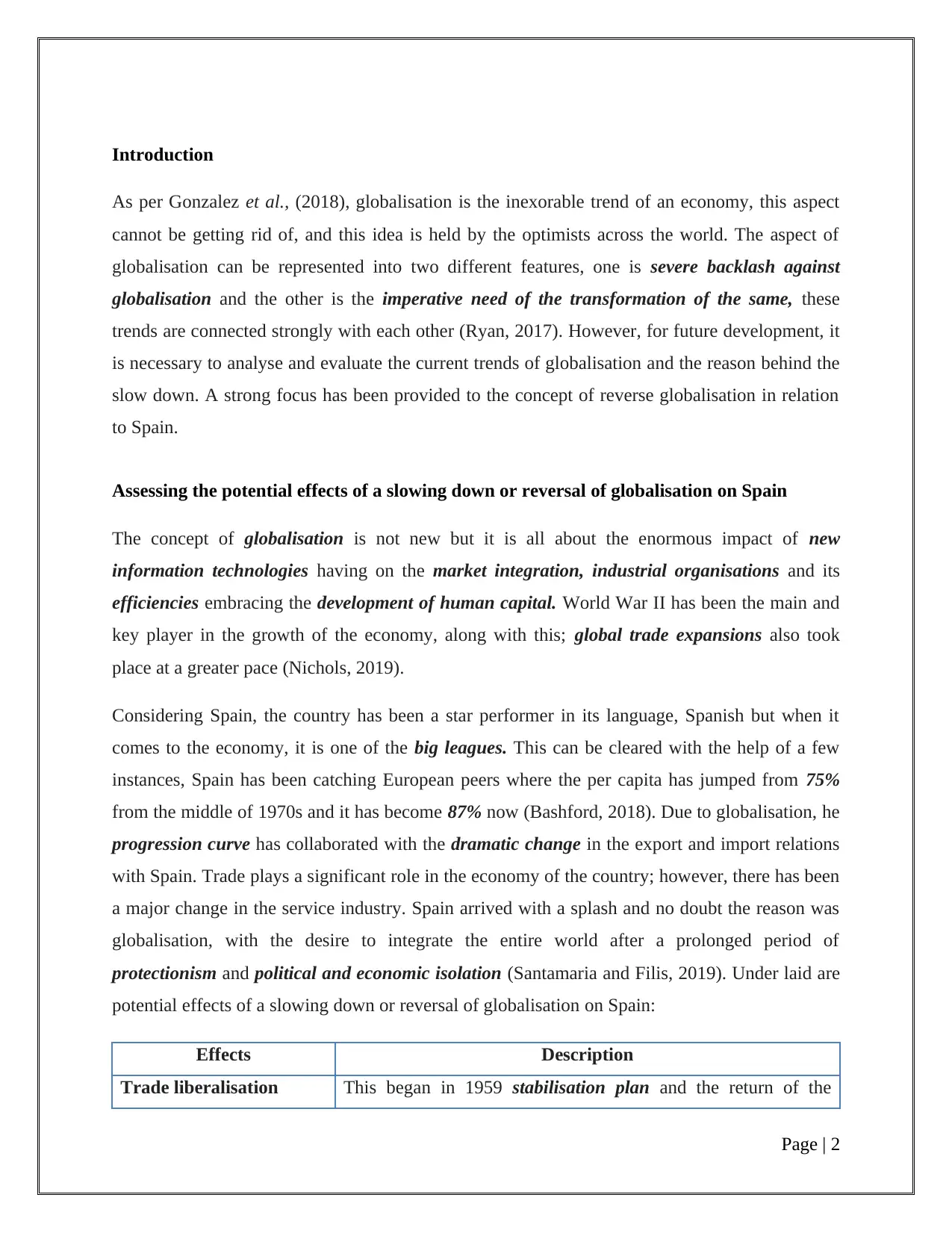
Introduction
As per Gonzalez et al., (2018), globalisation is the inexorable trend of an economy, this aspect
cannot be getting rid of, and this idea is held by the optimists across the world. The aspect of
globalisation can be represented into two different features, one is severe backlash against
globalisation and the other is the imperative need of the transformation of the same, these
trends are connected strongly with each other (Ryan, 2017). However, for future development, it
is necessary to analyse and evaluate the current trends of globalisation and the reason behind the
slow down. A strong focus has been provided to the concept of reverse globalisation in relation
to Spain.
Assessing the potential effects of a slowing down or reversal of globalisation on Spain
The concept of globalisation is not new but it is all about the enormous impact of new
information technologies having on the market integration, industrial organisations and its
efficiencies embracing the development of human capital. World War II has been the main and
key player in the growth of the economy, along with this; global trade expansions also took
place at a greater pace (Nichols, 2019).
Considering Spain, the country has been a star performer in its language, Spanish but when it
comes to the economy, it is one of the big leagues. This can be cleared with the help of a few
instances, Spain has been catching European peers where the per capita has jumped from 75%
from the middle of 1970s and it has become 87% now (Bashford, 2018). Due to globalisation, he
progression curve has collaborated with the dramatic change in the export and import relations
with Spain. Trade plays a significant role in the economy of the country; however, there has been
a major change in the service industry. Spain arrived with a splash and no doubt the reason was
globalisation, with the desire to integrate the entire world after a prolonged period of
protectionism and political and economic isolation (Santamaria and Filis, 2019). Under laid are
potential effects of a slowing down or reversal of globalisation on Spain:
Effects Description
Trade liberalisation This began in 1959 stabilisation plan and the return of the
Page | 2
As per Gonzalez et al., (2018), globalisation is the inexorable trend of an economy, this aspect
cannot be getting rid of, and this idea is held by the optimists across the world. The aspect of
globalisation can be represented into two different features, one is severe backlash against
globalisation and the other is the imperative need of the transformation of the same, these
trends are connected strongly with each other (Ryan, 2017). However, for future development, it
is necessary to analyse and evaluate the current trends of globalisation and the reason behind the
slow down. A strong focus has been provided to the concept of reverse globalisation in relation
to Spain.
Assessing the potential effects of a slowing down or reversal of globalisation on Spain
The concept of globalisation is not new but it is all about the enormous impact of new
information technologies having on the market integration, industrial organisations and its
efficiencies embracing the development of human capital. World War II has been the main and
key player in the growth of the economy, along with this; global trade expansions also took
place at a greater pace (Nichols, 2019).
Considering Spain, the country has been a star performer in its language, Spanish but when it
comes to the economy, it is one of the big leagues. This can be cleared with the help of a few
instances, Spain has been catching European peers where the per capita has jumped from 75%
from the middle of 1970s and it has become 87% now (Bashford, 2018). Due to globalisation, he
progression curve has collaborated with the dramatic change in the export and import relations
with Spain. Trade plays a significant role in the economy of the country; however, there has been
a major change in the service industry. Spain arrived with a splash and no doubt the reason was
globalisation, with the desire to integrate the entire world after a prolonged period of
protectionism and political and economic isolation (Santamaria and Filis, 2019). Under laid are
potential effects of a slowing down or reversal of globalisation on Spain:
Effects Description
Trade liberalisation This began in 1959 stabilisation plan and the return of the
Page | 2
⊘ This is a preview!⊘
Do you want full access?
Subscribe today to unlock all pages.

Trusted by 1+ million students worldwide
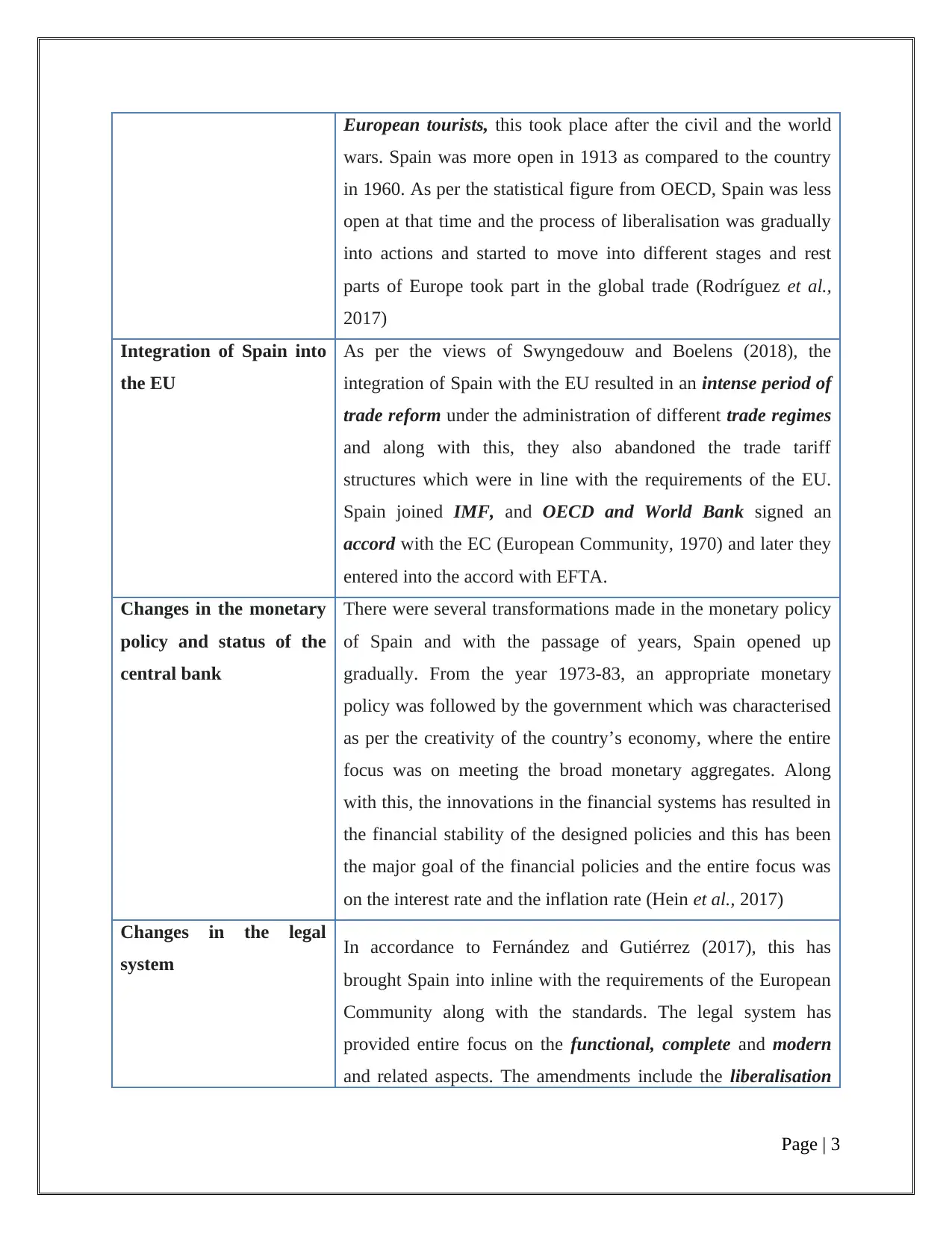
European tourists, this took place after the civil and the world
wars. Spain was more open in 1913 as compared to the country
in 1960. As per the statistical figure from OECD, Spain was less
open at that time and the process of liberalisation was gradually
into actions and started to move into different stages and rest
parts of Europe took part in the global trade (Rodríguez et al.,
2017)
Integration of Spain into
the EU
As per the views of Swyngedouw and Boelens (2018), the
integration of Spain with the EU resulted in an intense period of
trade reform under the administration of different trade regimes
and along with this, they also abandoned the trade tariff
structures which were in line with the requirements of the EU.
Spain joined IMF, and OECD and World Bank signed an
accord with the EC (European Community, 1970) and later they
entered into the accord with EFTA.
Changes in the monetary
policy and status of the
central bank
There were several transformations made in the monetary policy
of Spain and with the passage of years, Spain opened up
gradually. From the year 1973-83, an appropriate monetary
policy was followed by the government which was characterised
as per the creativity of the country’s economy, where the entire
focus was on meeting the broad monetary aggregates. Along
with this, the innovations in the financial systems has resulted in
the financial stability of the designed policies and this has been
the major goal of the financial policies and the entire focus was
on the interest rate and the inflation rate (Hein et al., 2017)
Changes in the legal
system In accordance to Fernández and Gutiérrez (2017), this has
brought Spain into inline with the requirements of the European
Community along with the standards. The legal system has
provided entire focus on the functional, complete and modern
and related aspects. The amendments include the liberalisation
Page | 3
wars. Spain was more open in 1913 as compared to the country
in 1960. As per the statistical figure from OECD, Spain was less
open at that time and the process of liberalisation was gradually
into actions and started to move into different stages and rest
parts of Europe took part in the global trade (Rodríguez et al.,
2017)
Integration of Spain into
the EU
As per the views of Swyngedouw and Boelens (2018), the
integration of Spain with the EU resulted in an intense period of
trade reform under the administration of different trade regimes
and along with this, they also abandoned the trade tariff
structures which were in line with the requirements of the EU.
Spain joined IMF, and OECD and World Bank signed an
accord with the EC (European Community, 1970) and later they
entered into the accord with EFTA.
Changes in the monetary
policy and status of the
central bank
There were several transformations made in the monetary policy
of Spain and with the passage of years, Spain opened up
gradually. From the year 1973-83, an appropriate monetary
policy was followed by the government which was characterised
as per the creativity of the country’s economy, where the entire
focus was on meeting the broad monetary aggregates. Along
with this, the innovations in the financial systems has resulted in
the financial stability of the designed policies and this has been
the major goal of the financial policies and the entire focus was
on the interest rate and the inflation rate (Hein et al., 2017)
Changes in the legal
system In accordance to Fernández and Gutiérrez (2017), this has
brought Spain into inline with the requirements of the European
Community along with the standards. The legal system has
provided entire focus on the functional, complete and modern
and related aspects. The amendments include the liberalisation
Page | 3
Paraphrase This Document
Need a fresh take? Get an instant paraphrase of this document with our AI Paraphraser
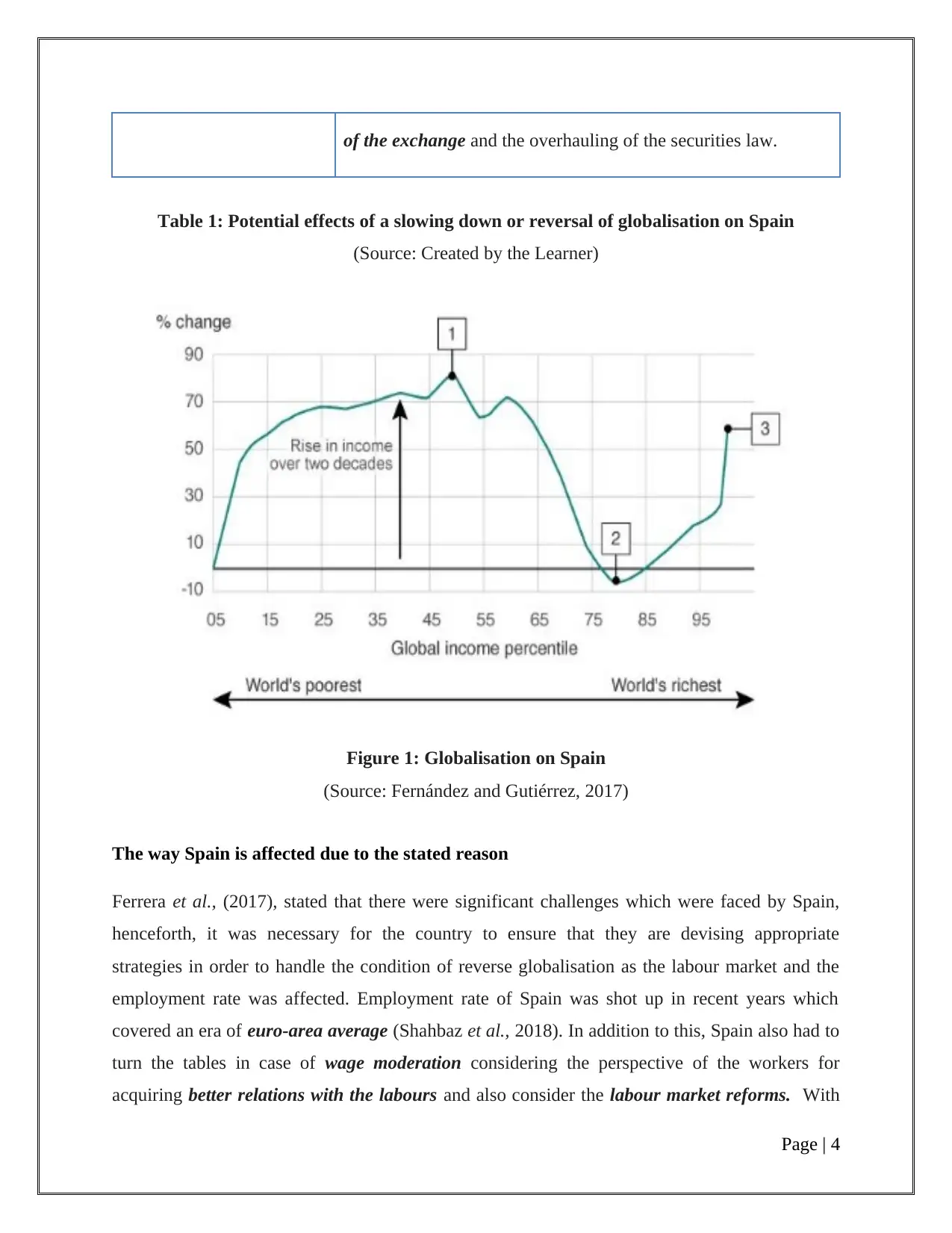
of the exchange and the overhauling of the securities law.
Table 1: Potential effects of a slowing down or reversal of globalisation on Spain
(Source: Created by the Learner)
Figure 1: Globalisation on Spain
(Source: Fernández and Gutiérrez, 2017)
The way Spain is affected due to the stated reason
Ferrera et al., (2017), stated that there were significant challenges which were faced by Spain,
henceforth, it was necessary for the country to ensure that they are devising appropriate
strategies in order to handle the condition of reverse globalisation as the labour market and the
employment rate was affected. Employment rate of Spain was shot up in recent years which
covered an era of euro-area average (Shahbaz et al., 2018). In addition to this, Spain also had to
turn the tables in case of wage moderation considering the perspective of the workers for
acquiring better relations with the labours and also consider the labour market reforms. With
Page | 4
Table 1: Potential effects of a slowing down or reversal of globalisation on Spain
(Source: Created by the Learner)
Figure 1: Globalisation on Spain
(Source: Fernández and Gutiérrez, 2017)
The way Spain is affected due to the stated reason
Ferrera et al., (2017), stated that there were significant challenges which were faced by Spain,
henceforth, it was necessary for the country to ensure that they are devising appropriate
strategies in order to handle the condition of reverse globalisation as the labour market and the
employment rate was affected. Employment rate of Spain was shot up in recent years which
covered an era of euro-area average (Shahbaz et al., 2018). In addition to this, Spain also had to
turn the tables in case of wage moderation considering the perspective of the workers for
acquiring better relations with the labours and also consider the labour market reforms. With
Page | 4
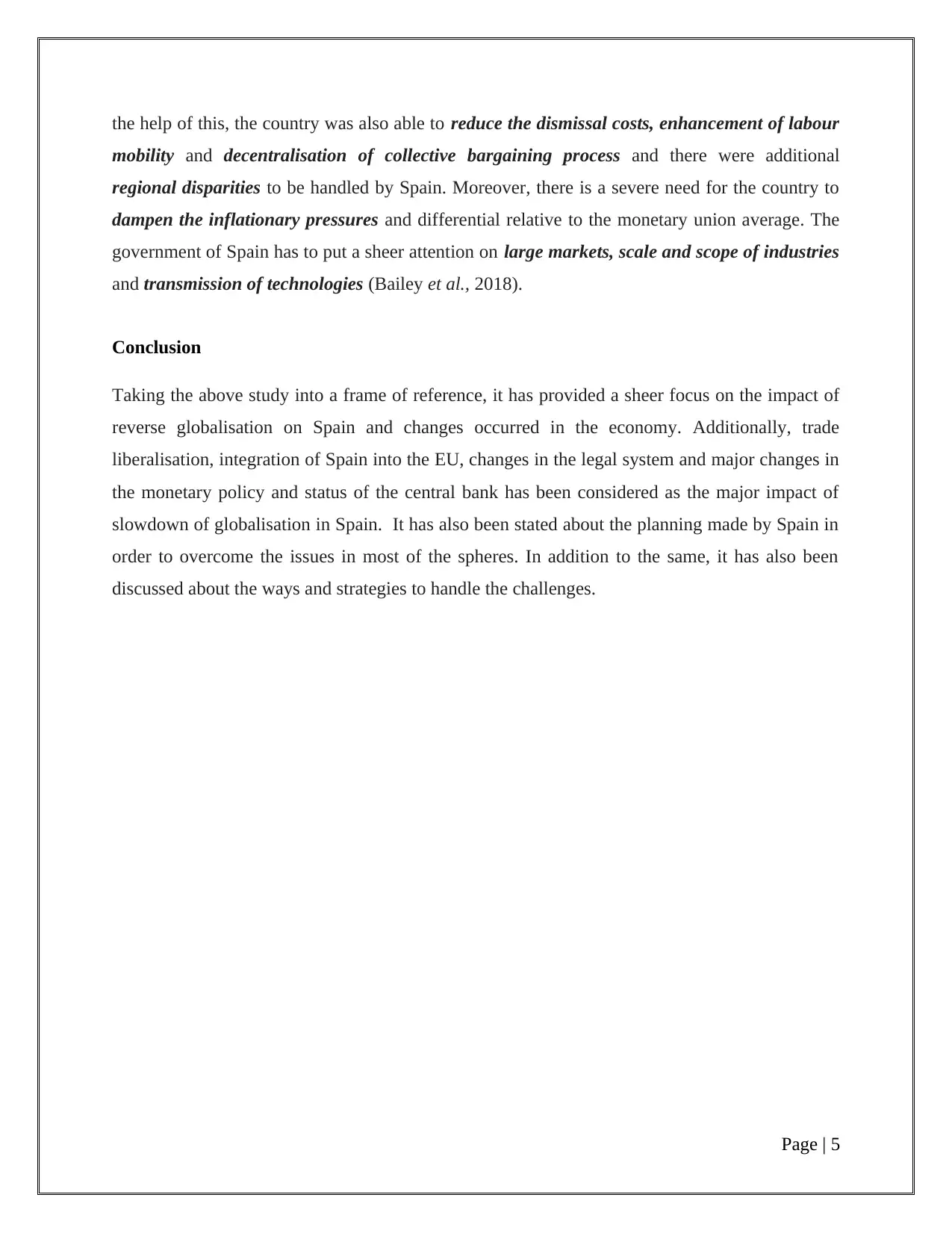
the help of this, the country was also able to reduce the dismissal costs, enhancement of labour
mobility and decentralisation of collective bargaining process and there were additional
regional disparities to be handled by Spain. Moreover, there is a severe need for the country to
dampen the inflationary pressures and differential relative to the monetary union average. The
government of Spain has to put a sheer attention on large markets, scale and scope of industries
and transmission of technologies (Bailey et al., 2018).
Conclusion
Taking the above study into a frame of reference, it has provided a sheer focus on the impact of
reverse globalisation on Spain and changes occurred in the economy. Additionally, trade
liberalisation, integration of Spain into the EU, changes in the legal system and major changes in
the monetary policy and status of the central bank has been considered as the major impact of
slowdown of globalisation in Spain. It has also been stated about the planning made by Spain in
order to overcome the issues in most of the spheres. In addition to the same, it has also been
discussed about the ways and strategies to handle the challenges.
Page | 5
mobility and decentralisation of collective bargaining process and there were additional
regional disparities to be handled by Spain. Moreover, there is a severe need for the country to
dampen the inflationary pressures and differential relative to the monetary union average. The
government of Spain has to put a sheer attention on large markets, scale and scope of industries
and transmission of technologies (Bailey et al., 2018).
Conclusion
Taking the above study into a frame of reference, it has provided a sheer focus on the impact of
reverse globalisation on Spain and changes occurred in the economy. Additionally, trade
liberalisation, integration of Spain into the EU, changes in the legal system and major changes in
the monetary policy and status of the central bank has been considered as the major impact of
slowdown of globalisation in Spain. It has also been stated about the planning made by Spain in
order to overcome the issues in most of the spheres. In addition to the same, it has also been
discussed about the ways and strategies to handle the challenges.
Page | 5
⊘ This is a preview!⊘
Do you want full access?
Subscribe today to unlock all pages.

Trusted by 1+ million students worldwide
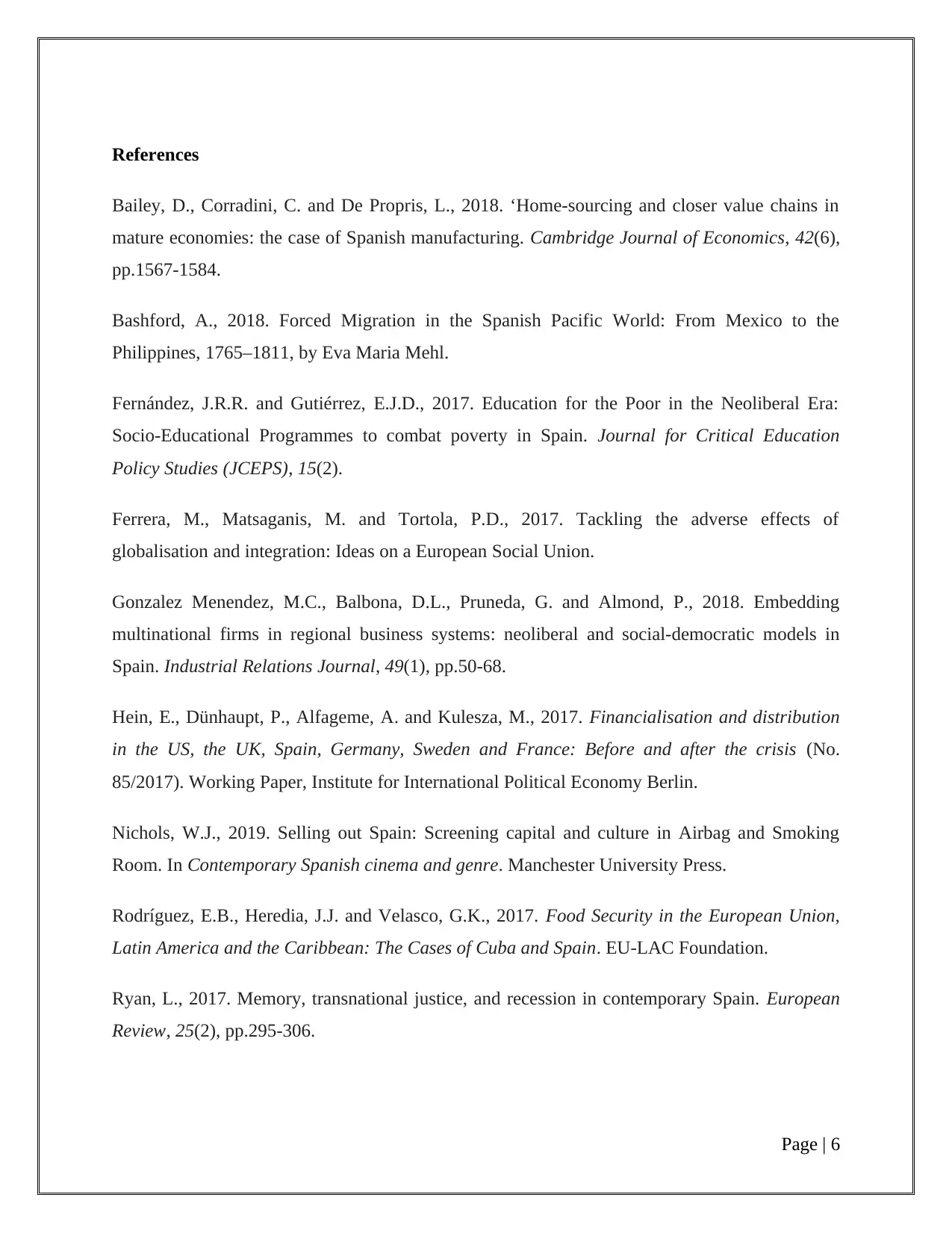
References
Bailey, D., Corradini, C. and De Propris, L., 2018. ‘Home-sourcing and closer value chains in
mature economies: the case of Spanish manufacturing. Cambridge Journal of Economics, 42(6),
pp.1567-1584.
Bashford, A., 2018. Forced Migration in the Spanish Pacific World: From Mexico to the
Philippines, 1765–1811, by Eva Maria Mehl.
Fernández, J.R.R. and Gutiérrez, E.J.D., 2017. Education for the Poor in the Neoliberal Era:
Socio-Educational Programmes to combat poverty in Spain. Journal for Critical Education
Policy Studies (JCEPS), 15(2).
Ferrera, M., Matsaganis, M. and Tortola, P.D., 2017. Tackling the adverse effects of
globalisation and integration: Ideas on a European Social Union.
Gonzalez Menendez, M.C., Balbona, D.L., Pruneda, G. and Almond, P., 2018. Embedding
multinational firms in regional business systems: neoliberal and social‐democratic models in
Spain. Industrial Relations Journal, 49(1), pp.50-68.
Hein, E., Dünhaupt, P., Alfageme, A. and Kulesza, M., 2017. Financialisation and distribution
in the US, the UK, Spain, Germany, Sweden and France: Before and after the crisis (No.
85/2017). Working Paper, Institute for International Political Economy Berlin.
Nichols, W.J., 2019. Selling out Spain: Screening capital and culture in Airbag and Smoking
Room. In Contemporary Spanish cinema and genre. Manchester University Press.
Rodríguez, E.B., Heredia, J.J. and Velasco, G.K., 2017. Food Security in the European Union,
Latin America and the Caribbean: The Cases of Cuba and Spain. EU-LAC Foundation.
Ryan, L., 2017. Memory, transnational justice, and recession in contemporary Spain. European
Review, 25(2), pp.295-306.
Page | 6
Bailey, D., Corradini, C. and De Propris, L., 2018. ‘Home-sourcing and closer value chains in
mature economies: the case of Spanish manufacturing. Cambridge Journal of Economics, 42(6),
pp.1567-1584.
Bashford, A., 2018. Forced Migration in the Spanish Pacific World: From Mexico to the
Philippines, 1765–1811, by Eva Maria Mehl.
Fernández, J.R.R. and Gutiérrez, E.J.D., 2017. Education for the Poor in the Neoliberal Era:
Socio-Educational Programmes to combat poverty in Spain. Journal for Critical Education
Policy Studies (JCEPS), 15(2).
Ferrera, M., Matsaganis, M. and Tortola, P.D., 2017. Tackling the adverse effects of
globalisation and integration: Ideas on a European Social Union.
Gonzalez Menendez, M.C., Balbona, D.L., Pruneda, G. and Almond, P., 2018. Embedding
multinational firms in regional business systems: neoliberal and social‐democratic models in
Spain. Industrial Relations Journal, 49(1), pp.50-68.
Hein, E., Dünhaupt, P., Alfageme, A. and Kulesza, M., 2017. Financialisation and distribution
in the US, the UK, Spain, Germany, Sweden and France: Before and after the crisis (No.
85/2017). Working Paper, Institute for International Political Economy Berlin.
Nichols, W.J., 2019. Selling out Spain: Screening capital and culture in Airbag and Smoking
Room. In Contemporary Spanish cinema and genre. Manchester University Press.
Rodríguez, E.B., Heredia, J.J. and Velasco, G.K., 2017. Food Security in the European Union,
Latin America and the Caribbean: The Cases of Cuba and Spain. EU-LAC Foundation.
Ryan, L., 2017. Memory, transnational justice, and recession in contemporary Spain. European
Review, 25(2), pp.295-306.
Page | 6
Paraphrase This Document
Need a fresh take? Get an instant paraphrase of this document with our AI Paraphraser
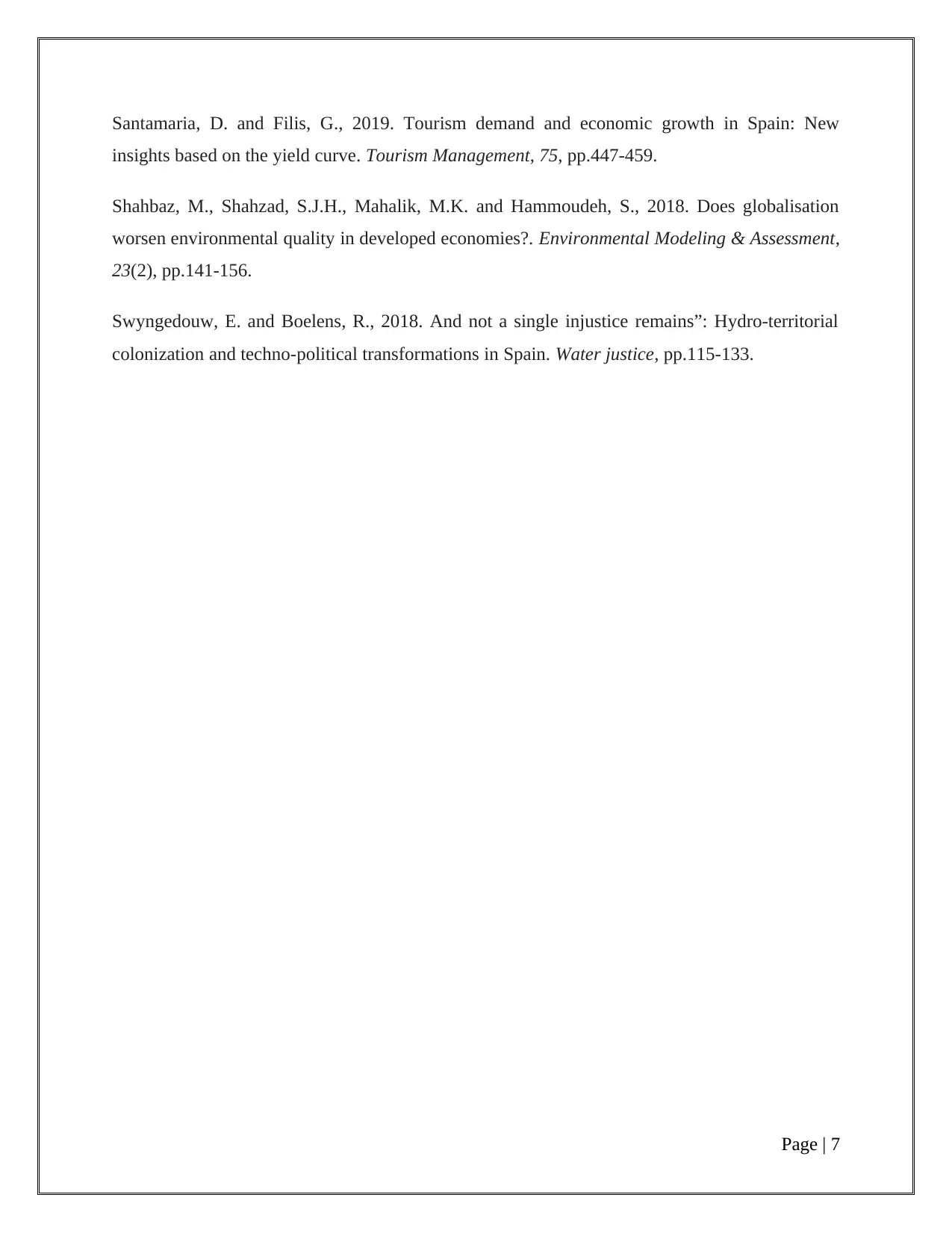
Santamaria, D. and Filis, G., 2019. Tourism demand and economic growth in Spain: New
insights based on the yield curve. Tourism Management, 75, pp.447-459.
Shahbaz, M., Shahzad, S.J.H., Mahalik, M.K. and Hammoudeh, S., 2018. Does globalisation
worsen environmental quality in developed economies?. Environmental Modeling & Assessment,
23(2), pp.141-156.
Swyngedouw, E. and Boelens, R., 2018. And not a single injustice remains”: Hydro-territorial
colonization and techno-political transformations in Spain. Water justice, pp.115-133.
Page | 7
insights based on the yield curve. Tourism Management, 75, pp.447-459.
Shahbaz, M., Shahzad, S.J.H., Mahalik, M.K. and Hammoudeh, S., 2018. Does globalisation
worsen environmental quality in developed economies?. Environmental Modeling & Assessment,
23(2), pp.141-156.
Swyngedouw, E. and Boelens, R., 2018. And not a single injustice remains”: Hydro-territorial
colonization and techno-political transformations in Spain. Water justice, pp.115-133.
Page | 7
1 out of 8
Related Documents
Your All-in-One AI-Powered Toolkit for Academic Success.
+13062052269
info@desklib.com
Available 24*7 on WhatsApp / Email
![[object Object]](/_next/static/media/star-bottom.7253800d.svg)
Unlock your academic potential
Copyright © 2020–2025 A2Z Services. All Rights Reserved. Developed and managed by ZUCOL.





